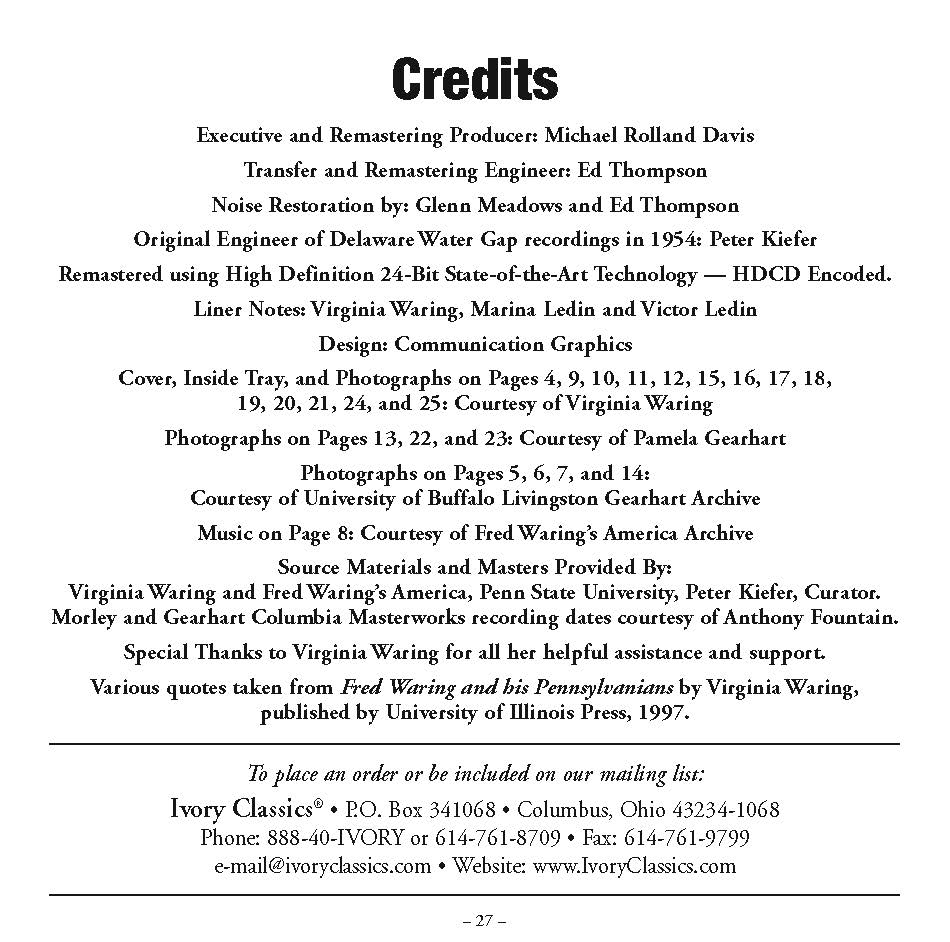Morley and Gearhart Rediscovered
Morley and Gearhart Rediscovered
Couldn't load pickup availability
Ivory Classics CD-72004(2CDs)
Morley and Gearhart Rediscovered
Piano: Virginia Morley
Piano: Livingston Gearhart
Producer: Michael Rolland Davis
Engineer: Ed Thompson
Piano: Steinway
(ADD) Recorded in 1947, 1949, 1951, 1954.
Remastered using 24-Bit State-of-the-Art Technology — HDCD Encoded
All Two Piano Arrangements by Livingston Gearhart except Arensky, Brahms, and Tailleferre.
From 1940 until 1954, the husband and wife two-piano duo of Virginia Morley and Livingston Gearhart made headlines crisscrossing the U.S. and Canada twenty-six times performing annual concert tours. Always accompanied by their two nine-foot Steinways in a separate custom van, they performed for enthusiastic audiences from Carnegie Hall to the Hollywood Bowl. Receiving rave reviews and standing ovations, audiences and critics alike were ecstatic and amazed at their musicianship. A typical review stated: "Miss Morley is beautiful. Mr. Gearhart is good-looking. Their duo-piano playing is magical. It was as if one brain were directing two pairs of hands on the same keyboard... and the applause, to coin a phrase, was thunderous. The pianists received more than a score of curtain calls."
Their unique brand of programming, combining sophisticated Livingston Gearhart arrangements of popular music with two-piano classical standards, along with new piano commissions (David Diamond, Norman Dello Joio and Darius Milhaud wrote two-piano compositions for them), made them truly unique. This 2-CD release of remastered historic recordings dating from 1947 to 1954, showcases the extraordinary two-piano artistry of Morley and Gearhart. Also included is a very informative and lavish 28-page booklet along with many rare photographs.
Disc.Reviews
I suspect that Rediscovery is very much the watchword for this scintillating release from Ivory. Two piano teams were hardly unfamiliar at the time that Virginia Morley (b.1915) and Livingston Gearhart (1916-1996) were popular – one can think of Vronsky and Babin, Smith and Sellick, Whittemore and Lowe and a number of other elite pairings – but the American duo's names will now be unfamiliar to most. More so, perhaps, than the other teams and unjustly.
The two Americans studied in Paris. They met in 1937 whilst both were students of Nadia Boulanger and Robert Casadesus and they gave their debut performance in February 1939 and then embarked on a mini-tour of Europe before the outbreak of War forced them to return to . They married in 1940 and played at supper clubs, broadcast on Fred Waring's show on NBC (initially wary of the idea, but the publicity was huge). Trans-continental American tours and command performances followed, as did a raft of recordings but after their divorce in 1953 the musical partnership also dissolved. Morley eventually married Waring. Probably the biggest contemporary piece dedicated to them was David Diamond's Concerto for Two Solo Pianos but a large quotient of their repertoire consisted of Gearhart's arrangements and adaptations from the classical repertoire and of popular songs. This two-disc set collates the product of their recording sessions over the period of their fourteen-year collaboration. They cut albums for American Columbia in 1947 and 1951 and two for the obscure Omni Sound in 1954 just as their professional and personal relationship was coming to an end. But fun it all is – fun with a capital F.
Gearheart's Three Blind Mice gives us a glimpse into his arrangement and adaptation priorities; teasing, tricksy, saturated in Gershwin era drive with not a little Hollywood thrown in. But when he turns to, say, Strauss's Waltzes from Der Rosenkavalier we find he's much more respectful; this is his own arrangement not the more popular Singer and it's altogether straighter and lasts shy of five minutes. Their Falla is thrilling; it's a pity in a way that the two pieces they recorded from El Amor Brujo are separated one to a disc but it means, I suppose, that we can encounter their accent-driven drama anew. Examples of the sophisticated supper club fare they furnished comes with songs by Kern, Berlin, Duke, Youmans, Richard Rodgers and the like. There are numerous examples scattered throughout such as Keeney's once ubiquitous Mountain Tune. But their French lineage remained intact – cast your ears over the brisk Poulenc single movement or their way with a contemporary French pop song, Lenoir's Parlez moi d'amour.
Then there's Gershwin – highlights from the Concerto in F finale and An American in Paris, all carried off with such brio it makes one wish they'd recorded the whole lot (their I Got Rhythm has an alpha lashing of pep). The original two piano works, such as the charming Arensky Waltz are played with discernment and great adroitness. They were quite able to distinguish between supper club and concert stage and with an ensemble as water tight as theirs one could hardly doubt either their panache or their sensitivity. If in doubt go to Glière's Sailor's Dance from The Red Poppy where you'll hear fleetness, colour and some splendid bass "lurches." So, yes, you'll find saucy ones (Braham's Limehouse Blues) and smooth boogie (Gearhart's own Baby Boogie) as well as Chopin and Rimsky flag-wavers, decked out in virtuosic plumage, all of them kept alive and coiling with constant ear-titillating panache.
The notes are extensive and contain much biographical material as well as numerous reflections and recollections from Virginia Morley. There are also some delightful photographs. Transfers are spot-on – not too much filtering. So if you fancy some two-piano wizardry – as announced on Ivory's cover and who am I to disagree – you know where to find it.
Jonathan Woolf, Music Web.com, Apr. 2005
"All 43 selections are...technically difficult, lively, jazzy, and skillfully designed for maximum popular entertainment...The sound is good, the program notes are interesting, and the pianists offer a couple of hours of light-hearted diversion."
Morin, American Record Guide, Aug. 2002
This material is so engaging that the listener feels no fatigue as he experiences it straight through... When you need a little musical honey to be poured on the praline, Morley and Gearhart supply it... The sound on these recordings doesn't show its age; the remastering is excellent.
Fanfare Magazine, Mar. 2002
From 1940 until 1954, the two-piano team of Virginia Morley and Livingston Gearhart enjoyed wide popularity with concert, radio, and nightclub audiences. Both were scholarship students of Robert Casadesus and Nadia Boulanger when they met in Paris in 1937. A professional and personal relationship ensued, ending in 1954 with the couple's divorce. Their programs encompassed repertoire from duo-piano classics to Gearhart's own two-piano arrangements of popular and concert music fare. Gearhart's concert music transcriptions generally remain faithful to the original source, although there are plenty of elaborations and added intricacies that will surely tickle even the most jaded ears. Having the advantage of two more hands, Gearhart recasts Chopin's Minute Waltz in breathtaking thirds and adds all sorts of buzzing insects to Rimsky K's fabled bumblebee flight. On the other hand, Gearhart opts for a shorter tour through Strauss' Rosenkavalier Waltzes than Otto Singer provides in his better-known arrangement.
Purists might regret that Gershwin's An American in Paris and the Finale of his F major Concerto are pruned to half their sizes, yet the cuts, though unnecessary, do make musical sense. So do the discreet truncations within the Blue Danube Waltz and Liszt's Second Hungarian Rhapsody. Popular tunes like All the Things You Are, Limehouse Blues, April in Paris, Russian Lullaby, Stormy Weather, Body and Soul, and Goodnight Ladies (among others) are jam-packed with slippery harmonic twists and turns that resemble two Art Tatums breaking bread with Poulenc and Milhaud, and perhaps imbibing a wee bit in the process. "Straight" classical pieces like the Arensky Waltz, eight Brahms Waltzes, and Tailleferre's gorgeous La Tirelitentaine are served up with incandescent flair and absolutely seamless ensemble values. All I can say is that some extraordinary piano duo wizardry awaits you on this fascinating and truly fun release.
Jed Distler, Classics Today, Jan. 2002
For those whose two-piano listening have been confined to the Labeque sisters, this album will be something of a revelation. Even for us who are well familiar with Vronsky and Babin, Whittemore and Lowe, and Gold and Fizdale, the 14-year collaboration of Morley and Gearhart (1940-1954) may well have slipped by, despite their recordings and David Diamond's having dedicated his Concerto for Two Solo Pianos to them. A favorite duo for Fred Waring, the Gearharts originally met as part of Robert Casadesus and Nadia Boulanger's master class in Paris, 1937. Virginia's maiden name, Clotfelter, found a more euphonious stage name in Morley; she became Mrs. Gearhart in 1940. At first, the duo specialized in Gallic fare, like Debussy En Blanc et Noir; but with their access to night clubs and radio, Livingston used his training in composition from Boulanger, Stravinsky and Milhaud to create enduring arrangements from classics to Broadway and Tin Pan Alley. Virginia, by the way, after the couple's separation, became Mrs. Fred Waring.
These two CD's from Ivory Classics offer 43 cuts, music from Gearhart's arrangement of "Three Blind Mice" to Poulenc's Movements perpetuels, Hoagy Carmichael's Star Dust, to Chopin's "Minute" Waltz, Youmans "Tea for Two" and Bach's "Jesu, Joy of Man's Desiring." Consistently, the playing is exceeding suave, fleet, even glibly secure. Most of the tempos are fast, even in eight of the Brahms waltzes. The playing in Debussy's "Fetes" will bear comparison with the recording by the Lhevinne's in the 1930's. They play the Arensky Op. 15 Waltz with the same schwung as Gabrilowitsch and Levitzky, only in better sound. Many of the cuts seem to come out of Hollywood soundtracks, like the arrangements of Arlen's "Stormy Weather," Rodgers' "With a Song in My Heart," and Green's "Body and Soul." Gershwin's An American in Paris is breezy, deft, and it enjoys any number of coloristic touches, from honking taxicabs to evocations of Paris night-life. For both touch-piece accuracy and agile symmetry of motion, try their Liadov Music-Box, Op. 32 and Kodaly's "The Viennese Musical Clock" from Hary Janos. From the French salon we have Tailleferre's "La Tirelitentaine" and Lenoir's "Parlez moi d'amour," which all but evokes the voice of Piaf.
Typically, the team of Morley and Gearhart gleaned the highest praise for the intelligence and polish of their playing, for what Isabel Morse Jones called their "precision and simultaneous musical thinking." These discs confirm her opinion and then some.
Audiophile Audition, Dec. 2001




















































